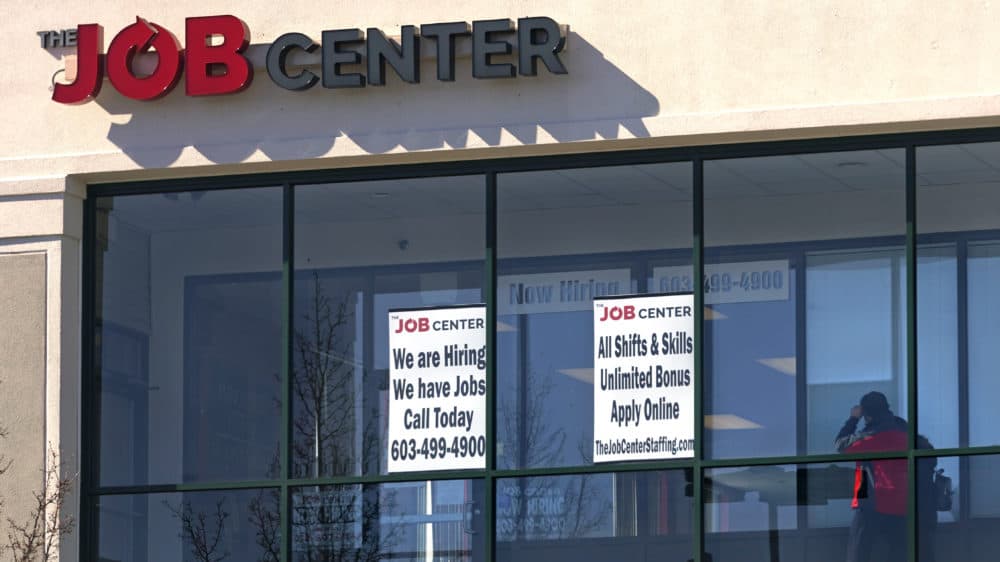Advertisement
Mass. Unemployment Falls To 6.8% In March, Down From 7% In Feb.

Unemployment in Massachusetts edged down 0.2 percentage points to 6.8% in March, as the state continues to slowly recover from the business shutdowns that accompanied the pandemic.
The Executive Office of Labor and Workforce Development announced Friday that the state also picked up 12,800 jobs in March, following a gain of 19,700 jobs in February.
But Massachusetts still has a long way to go to recover jobs shed during the pandemic. The federal government estimated that Massachusetts lost 272,700 jobs from March 2020 (just before the state's unemployment rate started to climb at the beginning of the pandemic) to March 2021, according to the state.
The downturn was especially severe for restaurants, hotels and similar businesses in the leisure and hospitality sector. With a 24.2% jobless rate in March, the sector lost nearly one in four jobs over the year. But some parts of the economy have seen positive signs since February, when leisure and hospitality grew 4%. In March, that sector grew another 2.2%.
The construction sector is one bright spot, nearly recovering from the impact of COVID-19. Construction added 2,500 jobs in March, with unemployment down just 1% from before the pandemic.
The coronavirus outbreak caused the unemployment rate to skyrocket as high as 16.4% from its low of 2.7% in March 2020, which UMass Amherst economist Rod Motamedi said the was the lowest recorded in Massachusetts since 1976.
Asked when the state will return to such a heady economy, Motamedi said: "That's a tough one." He said different industries likely will bounce back quicker than others, even within the same sectors.
"The international airlines are putting out [signals] that they're expecting pretty rapid recovery in demand," Motamedi said. "But on a local, town-level basis... the bars, the restaurants and those kinds of things — I think I'm pretty hopeful about about those [recovering] in the coming few months."
Jeffrey Miron, an economist at Harvard University and director of economic studies at the libertarian Cato Institute, says progress doesn't necessarily mean returning to "super-low pre-pandemic numbers."
"But in terms of getting back to something more like the standard long-run average that people think of as sustainable — somewhere between 4.5 and 6% — the prospects would seem to be good because the pandemic is more or less coming under control," Miron said.
Still, Miron said, judging from previous recessions, it could take years for the unemployment rate to return to a sustainable level.
"Businesses shed a lot of employees that weren't supercritical during downturns, and then they're a little bit more careful about adding them back in, even though things are improving," Miron said.
Despite some growth areas, the state's unemployment rate has remained stubbornly high compared to most states.
In February, Massachusetts had the 12th highest unemployment rate in the country at 7.1%. Hawaii, which heavily relies on tourism, had the highest unemployment rate nationwide at 9.2% that month. South Dakota, which had fewer COVID-19 restrictions than many other states, had the lowest unemployment rate nationally, at 2.9%.
Among New England states, Vermont had the lowest unemployment rate in February at 3.1%. Connecticut was highest at 8.5%.
On Thursday, the Massachusetts labor department reported that new unemployment claims declined by nearly 5,800 last week as the state continues to relax restrictions on businesses and more people are vaccinated.

